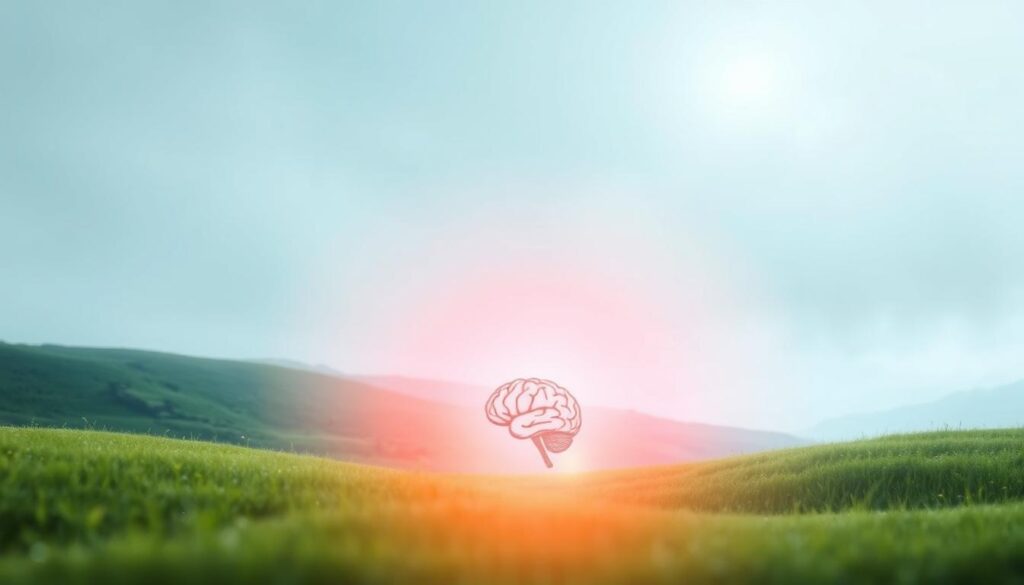Understanding one’s mental well-being is crucial in today’s fast-paced world. The term “mental health” is often used, but what does it really mean?
The definition of mental health encompasses our emotional, psychological, and social well-being. It affects how we think, feel, and act, determining how we handle stress, relate to others, and make choices.
Having a clear mental health definition helps us understand its importance and how it impacts our lives. By grasping this concept, we can better navigate the challenges of modern life and improve our overall well-being.
Key Takeaways
- Understanding mental health is vital for overall well-being.
- Mental health includes emotional, psychological, and social aspects.
- A clear definition helps in recognizing its impact on daily life.
- It influences how we handle stress and interact with others.
- Grasping the concept of mental health can lead to better life choices.
A Definition of Mental Health: What It Really Means
Mental health is a term that is often used, but what does it really mean? Understanding mental health is essential for maintaining a healthy lifestyle and overall well-being. It encompasses various aspects of our lives, including emotional, psychological, and social well-being.

The Clinical Definition vs. Everyday Understanding
The clinical definition of mental health refers to a person’s overall emotional, psychological, and social well-being. In contrast, the everyday understanding of mental health often revolves around the absence of mental illness. However, this narrow perspective overlooks the complexities of mental health. Mental health is not just the absence of mental illness, but a state of well-being that enables individuals to cope with stress, work productively, and contribute to their communities.
- Emotional well-being: the ability to manage emotions and maintain a positive outlook.
- Psychological well-being: the capacity to cope with stress and maintain cognitive function.
- Social well-being: the ability to form and maintain meaningful relationships.
How Mental Health Differs from Mental Illness
Mental health and mental illness are often used interchangeably, but they have distinct meanings. Mental illness refers to specific conditions, such as depression, anxiety, or trauma, that affect an individual’s mental well-being. In contrast, mental health encompasses a broader spectrum of well-being, including emotional, psychological, and social aspects. Understanding the difference between mental health and mental illness is crucial for promoting mental well-being and seeking appropriate support when needed.
By recognizing the distinction between mental health and mental illness, individuals can take proactive steps to maintain their mental well-being and seek help when needed.
The Five Core Components of Mental Health
Good mental health is not just the absence of mental illness, but a comprehensive state influenced by several core components. Understanding these elements is crucial for promoting mental health and overall well-being.
Emotional Well-being
Emotional well-being is a foundational aspect of mental health, involving the ability to recognize and manage one’s emotions effectively.
Recognizing and Managing Emotions
Being aware of and able to regulate one’s emotional responses is vital for maintaining emotional balance.
Emotional Intelligence and Mental Health
Emotional intelligence plays a significant role in mental health by enabling individuals to empathize with others and manage their own emotions.
Psychological Well-being
Psychological well-being encompasses self-acceptance, personal growth, and having a purpose in life, all of which are critical for good mental health.
Self-acceptance and Personal Growth
Accepting oneself and striving for personal growth are key to psychological well-being, fostering a positive self-image and life satisfaction.
Purpose and Autonomy
Having a sense of purpose and autonomy allows individuals to feel in control of their lives, contributing to better mental health.

Social Well-being
Social connections and relationships significantly impact mental health, highlighting the importance of building and maintaining healthy social networks.
Building Healthy Relationships
Nurturing positive relationships with family, friends, and community is essential for emotional support and a sense of belonging.
Community Connection and Belonging
Feeling connected to a community enhances mental well-being by providing a support system and reducing feelings of isolation.
| Component | Description | Impact on Mental Health |
|---|---|---|
| Emotional Well-being | Recognizing and managing emotions | Enhances emotional balance and resilience |
| Psychological Well-being | Self-acceptance and personal growth | Fosters positive self-image and life satisfaction |
| Social Well-being | Building healthy relationships and community connection | Provides emotional support and reduces isolation |
Physical Factors That Affect Mental Health
Physical health has a direct impact on mental health, with factors like exercise, nutrition, and sleep playing crucial roles.
Resilience and Coping Abilities
The ability to cope with stress and bounce back from adversity is vital for maintaining good mental health, highlighting the importance of developing resilience.
How to Recognize Good Mental Health in Yourself
Good mental health is not just the absence of mental illness, but a state of well-being that enables you to realize your potential. Recognizing its signs can empower you to maintain and improve your mental well-being.
Key Indicators of Positive Mental Health
Positive mental health is characterized by several key indicators, which can be observed through various signs.
Behavioral Signs
- Engaging in regular physical activity
- Maintaining a healthy sleep schedule
- Participating in activities you enjoy
Emotional Signs
- Feeling generally happy and content
- Being able to manage stress effectively
- Experiencing a sense of purpose and fulfillment
Cognitive Signs
- Having a positive outlook on life
- Being able to concentrate and make decisions
- Maintaining a sense of curiosity and openness to new experiences
Self-Assessment Tools and Questions
To further understand your mental health, utilizing self-assessment tools can be beneficial.
Daily Mental Health Check-ins
Regularly checking in with yourself can help identify patterns and areas for improvement. Ask yourself: How am I feeling today? What are my thoughts and emotions?
Structured Self-Assessment Resources
There are various structured resources available, such as mental health questionnaires and online assessments, that can provide insights into your mental well-being.

Steps to Understand Your Current Mental Health Status
To improve your mental health, it’s essential to first understand where you stand. Understanding your mental health status is a crucial step towards achieving overall well-being and making informed decisions about your life.
Step 1: Monitoring Your Thoughts and Feelings
Monitoring your thoughts and feelings is the first step towards understanding your mental health. This involves being aware of your emotional state and recognizing patterns or triggers.
Journaling Techniques
Journaling is a powerful tool for monitoring your thoughts and feelings. By writing down your experiences, you can identify recurring themes and gain insights into your mental state.
Mindfulness Practices
Mindfulness practices, such as meditation and deep breathing, can help you stay present and aware of your thoughts and feelings. Regular mindfulness practice can enhance your ability to monitor your mental state.
Step 2: Evaluating Your Relationships and Social Connections
Your relationships and social connections play a significant role in your mental health. Evaluating these connections can help you identify sources of support and potential stress.
Identifying Supportive vs. Draining Relationships
It’s essential to distinguish between relationships that support your mental health and those that drain your energy. Surrounding yourself with positive influences can significantly improve your mental well-being.
Building a Healthy Social Network
Building a healthy social network involves nurturing positive relationships and engaging in social activities that bring you joy. A strong social network can provide emotional support and enhance your mental health.

Step 3: Assessing Your Ability to Handle Stress
Assessing your ability to handle stress is crucial for maintaining good mental health. This involves recognizing your stress responses and developing healthy coping mechanisms.
Recognizing Your Stress Responses
Understanding how you respond to stress is vital. Whether you become anxious, withdrawn, or irritable, recognizing your stress responses can help you manage them more effectively.
Developing Healthy Coping Mechanisms
Developing healthy coping mechanisms, such as exercise, meditation, or creative activities, can help you manage stress. These mechanisms can enhance your resilience and improve your mental health.
Step 4: Recognizing When to Seek Professional Guidance
Knowing when to seek professional help is a critical aspect of maintaining good mental health. If you’re struggling to manage your mental health, seeking guidance from a mental health professional can provide you with the support you need.
| Step | Description | Benefits |
|---|---|---|
| Step 1: Monitoring Thoughts and Feelings | Being aware of your emotional state and recognizing patterns or triggers. | Gain insights into your mental state, identify recurring themes. |
| Step 2: Evaluating Relationships | Assessing your social connections and identifying supportive relationships. | Enhance your mental well-being, surround yourself with positive influences. |
| Step 3: Assessing Stress Handling | Recognizing your stress responses and developing healthy coping mechanisms. | Improve your resilience, manage stress effectively. |
| Step 4: Seeking Professional Guidance | Knowing when to seek help from a mental health professional. | Receive the support you need, manage your mental health effectively. |
Mental Health Resources and Support Systems
Mental health resources and support systems play a vital role in helping individuals manage their mental wellbeing. Access to these resources can make a significant difference in maintaining good mental health.

Professional Mental Health Services
Professional mental health services are a cornerstone of mental health support. These services include therapy, counseling, and psychiatric care provided by licensed professionals.
Finding the Right Mental Health Professional
Finding the right mental health professional involves considering factors such as their specialty, approach to treatment, and personal rapport. It’s essential to find someone you feel comfortable with.
What to Expect from Therapy
Therapy can be a safe space to explore your feelings and challenges. It’s a collaborative process between you and your therapist. Understanding what to expect can help alleviate any apprehensions you might have.
Community and Online Support Options
In addition to professional services, community and online support options provide valuable networks for individuals seeking help. These can include support groups, online forums, and peer counseling services.
Support Groups and Peer Counseling
Support groups offer a sense of community and understanding among individuals facing similar challenges. Peer counseling provides support from individuals who have experienced similar issues.
Digital Mental Health Resources
Digital resources, including apps and online platforms, offer accessible tools for managing mental health. These resources can provide strategies for stress management, mood tracking, and more.
Self-Help Strategies and Tools
Self-help strategies are crucial for maintaining mental health. These can include evidence-based practices such as mindfulness, exercise, and journaling.
Evidence-Based Self-Care Practices
Evidence-based self-care practices are activities backed by research that can improve mental health. Examples include meditation and spending time in nature.
Creating a Personal Mental Health Plan
Creating a personal mental health plan involves setting goals and identifying strategies to achieve them. This plan should be tailored to your individual needs and preferences.
Conclusion: Embracing a Holistic View of Mental Health
Understanding the importance of mental health is crucial for overall well-being. As discussed, mental health encompasses various aspects, including emotional, psychological, and social well-being. A clear definition of mental well-being highlights its significance in our daily lives.
Promoting mental health involves recognizing its core components and taking steps to maintain a healthy balance. By being aware of our thoughts, feelings, and relationships, we can better assess our mental health status and identify areas for improvement.
Taking a holistic approach to mental health means considering all factors that influence our well-being. This includes seeking professional guidance when needed, leveraging community and online support options, and utilizing self-help strategies and tools.
By embracing this comprehensive view, individuals can foster a positive and supportive environment that encourages mental health promotion. Prioritizing mental health is essential for achieving overall wellness and improving quality of life.
FAQ
What is the definition of mental health?
Mental health refers to our emotional, psychological, and social well-being, encompassing how we think, feel, and behave. It affects how we handle stress, relate to others, and make choices.
How does mental health differ from mental illness?
Mental health is a broad term that refers to overall well-being, while mental illness refers to specific conditions like depression, anxiety, or trauma that affect mental health.
What are the core components of mental health?
The five core components of mental health are emotional well-being, psychological well-being, social well-being, physical factors, and resilience and coping abilities.
How can I recognize good mental health in myself?
Key indicators of positive mental health include behavioral signs like regular sleep and exercise, emotional signs like feeling calm and content, and cognitive signs like being able to focus and make decisions.
What self-assessment tools can I use to evaluate my mental health?
You can use daily mental health check-ins, structured self-assessment resources, and journaling techniques to evaluate your mental health and identify areas for improvement.
When should I seek professional help for my mental health?
If you’re experiencing overwhelming stress, persistent feelings of sadness or anxiety, or if you’re having trouble coping with daily life, it’s a good idea to seek professional guidance from a mental health professional.
What are some evidence-based self-care practices for mental health?
Evidence-based self-care practices include mindfulness, meditation, and exercise, which can help reduce stress and improve overall mental well-being.
How can I build a healthy social network to support my mental health?
Building a healthy social network involves identifying supportive relationships, joining social groups or clubs that align with your interests, and nurturing connections with others.
What are some digital mental health resources available?
Digital mental health resources include online therapy platforms, mental health apps, and online support groups, which can provide convenient access to mental health support and guidance.
